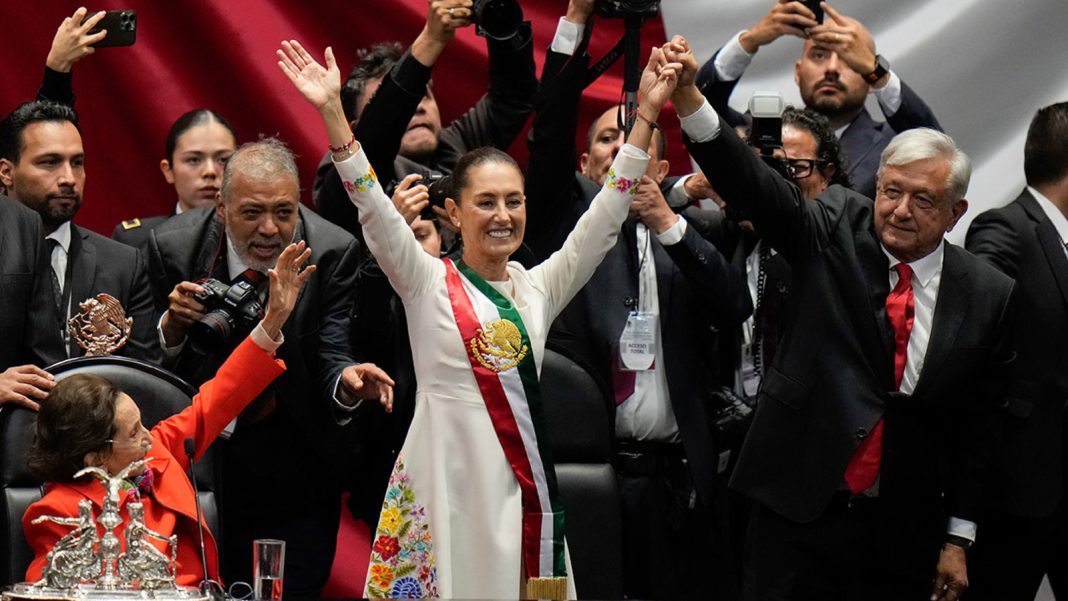Claudia Sheinbaum made history on Tuesday as she was sworn in as Mexico’s first female president, a milestone that resonates deeply within a nation grappling with persistent challenges, including rampant violence and a sluggish economy. Her inauguration, marked by the jubilant chants of “Presidenta! Presidenta!” from legislators, signifies a shift not only in leadership but in representation, as Sheinbaum embodies the aspirations of countless women who have long fought for recognition in a patriarchal society.
The 62-year-old scientist-turned-politician inherits a complex landscape, one fraught with pressing issues that have lingered under her predecessor, Andrés Manuel López Obrador. While Sheinbaum rides the wave of enthusiasm stemming from López Obrador’s social programs, she also faces the daunting task of addressing a nation marred by high levels of violence, a sluggish economy, and the aftermath of natural disasters, such as the destruction wrought by Hurricanes Otis and John in Acapulco.
In her inaugural address, Sheinbaum emphasized her commitment to inclusivity, stating that her presidency would represent all women who have struggled in silence. She promised to limit prices on essential goods like gasoline and food, expand cash handout programs for vulnerable populations, and bolster investments in housing and infrastructure. However, her approach to the drug cartels—an omnipresent threat in Mexican society—was notably brief. She reaffirmed her predecessor’s strategy of “Hugs not Bullets,” focusing on addressing the root causes of violence rather than confronting cartels directly, though she committed to enhancing intelligence operations and investigations.
Political analysts, including Carlos Pérez Ricart from Mexico’s Center for Economic Research and Teaching, highlight the contrasts between Sheinbaum and López Obrador. While the former president’s charisma often masked political missteps, Sheinbaum’s academic background and cautious demeanor suggest a different style of governance. “Claudia Sheinbaum will have to be effective,” Pérez Ricart notes, indicating that her administration will be scrutinized more rigorously than her predecessor’s.
Compounding her challenges, Sheinbaum steps into office amid a polarized political landscape, where enthusiasm for López Obrador’s policies is met with significant dissent. Opposition sentiments are particularly vocal regarding concerns over unchecked military power and diminished checks and balances. Senator María Guadalupe Murguía cautioned that while strong governance is vital, it must not come at the expense of democratic oversight: “Remember, nobody wins everything, and nobody loses forever.”
The nation’s security crisis is exacerbated by the increasing power of drug cartels, particularly in regions such as Culiacán, where violence has surged following the arrest of prominent cartel leaders. The limitations of López Obrador’s non-confrontational approach have become glaringly apparent, as local authorities admit that violence will persist until the cartels decide otherwise. The implications of such unrest are significant, as drug-related violence continues to displace thousands across the country, from Tijuana to Chiapas.
Moreover, Sheinbaum faces an impending economic crisis, marked by a substantial budget deficit and unfinished construction projects. The prospect of a potential Donald Trump victory in the upcoming U.S. presidential election looms large, with Trump threatening to impose tariffs on Mexican goods and revive strict immigration policies. This scenario could further complicate Mexico’s economic stability, already strained by fluctuating relations with the United States.
Despite these challenges, Sheinbaum’s background as a researcher and her emphasis on climate change and energy efficiency could signal a willingness to explore new directions for Mexico. Her Ph.D. in energy engineering positions her uniquely to address environmental concerns, although her inaugural pledge to cap oil production suggests a continuation of the status quo in energy policy.
As she embarks on her presidency, Sheinbaum’s first visit to the hurricane-affected Acapulco underscores the urgent need for effective disaster response and recovery efforts. The devastation from recent storms illustrates the vulnerabilities faced by coastal communities and the broader implications of climate change that require immediate attention.
In conclusion, Claudia Sheinbaum’s presidency represents a pivotal moment in Mexican history, blending the promise of social progress with the weight of significant challenges. As she navigates the complexities of governance, her ability to balance continuity with innovation will be critical in shaping the future of a nation at a crossroads. The path ahead will undoubtedly test her leadership, but it also offers an opportunity to redefine what it means to lead in a country that is ready for change.


